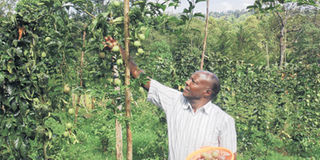We pick money from passion fruit weekly, thanks to low tea prices

Joseph Koech harvests passion fruits from his farm in Konoin, Bomet County. PHOTO | ANDREW MIBEI | NATION MEDIA GROUP
What you need to know:
- One then should erect strong posts along the rows at 6m intervals to support the plants that take six months to fruit but production peaks at one year. The farmers sell their fruits to D-Fresh Limited for export.
- At the collection centre, the fruits are sorted and graded then packed in 30kg crates for transportation to Nairobi where the maximum residue level is checked before being cleaned and packed in 2kg packets for Europe.
The compound that hosts the public library building in Simoti location, Bomet County is normally a beehive of activity every Friday.
Well, it is not students who meet here but a group of passion fruit farmers. They congregate in the compound every Friday afternoon with their harvest for sale.
Majority use motorbikes to ferry up to three 90kg bags of their produce to the collection centre, others carry the fruits on their backs.
“The harvest varies from farm to farm and some of our members bring over 100kg every week while others as little as 5kg,” says Joseph Koech, Simoti location chief and the chair of Chepkikon Self-Help Group.
The area has experienced a boom in passion fruit farming that has seen farmers shift from maize and tea.
Chepkikon members came together in 2012 after being trained by TechnoServe, an NGO. Initially, the group had 75 members but currently, only 50 are active.
After the training, each member bought 80 seedlings for planting at Sh20 per piece. This was enough to cover a tenth of an acre.
Koech planted 160 seedlings in his farm in Chongenwo village. The grafted seedlings are planted in 0.6 by 0.6m holes in a spacing of 2m between rows and 3m within rows. The top soil is mixed with well-composted manure.
One then should erect strong posts along the rows at 6m intervals to support the plants that take six months to fruit but production peaks at one year. The farmers sell their fruits to D-Fresh Limited for export.
At the collection centre, the fruits are sorted and graded then packed in 30kg crates for transportation to Nairobi where the maximum residue level is checked before being cleaned and packed in 2kg packets for Europe.
A tree should give at least a kilo of fruit every week but in ideal situations, the yield goes to over 2kg per tree, per week. Harvesting is mainly done every week but this can be affected by routine field practices like pruning and chemical application.
Koech’s biggest harvest in a week has been 156kg and the lowest 50kg. During our visit, Seeds of Gold witnessed Koech recording 108kg, equivalent to Sh7,560 if the buyer pays the least price of Sh70 per kilo.
“Sometimes we are paid up to Sh80 per kilo, which is why a farmer who harvests even 5kg every week earns a good amount of money in a month,” he says.
Florence Kurgat of Kaptebengwet village, who also grows passion fruit, says the crop has helped her pay school for her children after tea prices dropped.
“I planted 140 seedlings in 2012 and I don’t regret the decision to venture into passion fruit farming. If it were not for passion fruits, I would have no source of income because the price of tea, which I also grow, has gone down.”
During the Seeds of Gold visit, she had just brought 110kg of the fruits which will fetch her more than Sh7,000.
The farmers are paid every Monday and this makes the venture quite beneficial unlike tea whose pay is monthly and annually for bonuses.
Ruth Koech has less than 30 plants in her farm and she gets between 10-25kg every week earning her enough money to supplement her family’s budget.
However, all is not rosy for the passion fruit farmers because they have to contend with destructive pests and diseases that attack this precious fruit. The biggest challenge is the fungal Die back disease, which makes the branches wilt and die especially from the tip backwards. Once affected, the branch has to be cut off otherwise the entire plant will die.
James Saina, an agronomist at Kaimosi Agriculture Training Centre, says that to curb Die back, farmers should avoid planting their passion fruits in shaded areas and in case of attack, the disease can be treated using Ridomil.
Passion fruits are also attacked by the fungal Fusarium wilt and the viral Woodiness disease that Saina says though serious, can be controlled if a farmer observes proper handling of seedlings and keeps the field free from vectors.
“The seedlings should be grafted in a clean environment and the grafted section should be sterilised to avoid entry of the diseases. Disinfect pruning instruments too to avoid viral attacks.”
Saina advises farmers to spray the fruits immediately after harvesting, then ensure that no harvest is done until the stipulated 7-21 days are over, depending on the chemical used.
A farmer should not sell fruits during this period, she should burry them. Margaret Mosbei of D-Fresh Ltd says produce for export should not be too small and should have an even, smooth and shiny skin. The fruit should also be packed fresh from the farm and should be at least 85 per cent purple.
“During sorting, the green and the overripe ones are rejected just as those that show signs of disease attacks.”
The fruits are tested for maximum residual level to ensure that traces of chemicals used in their production do not exceed the set standards.




